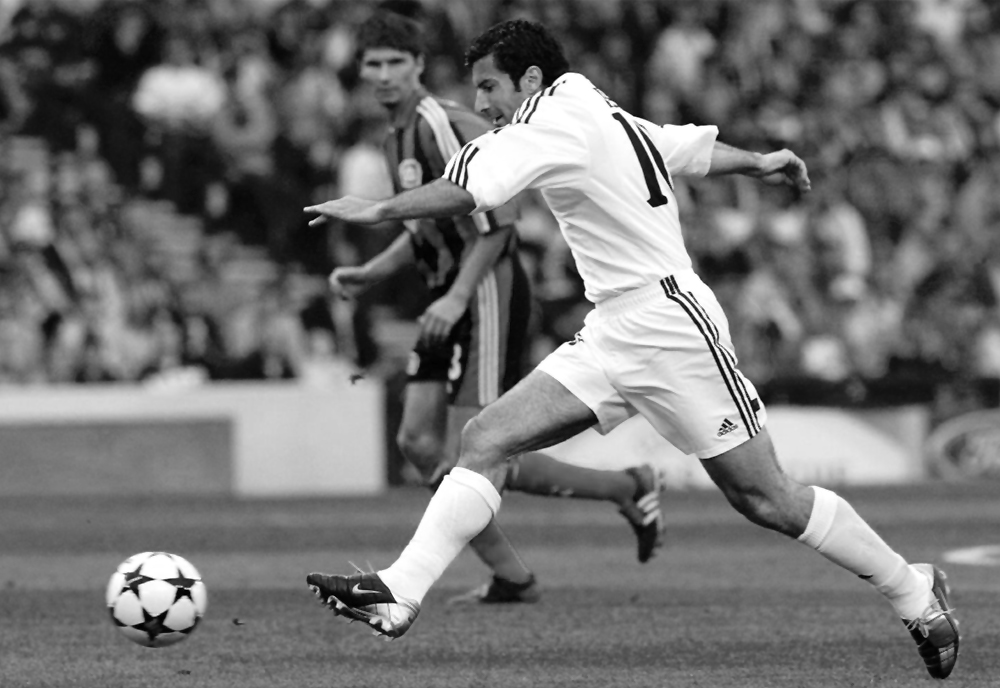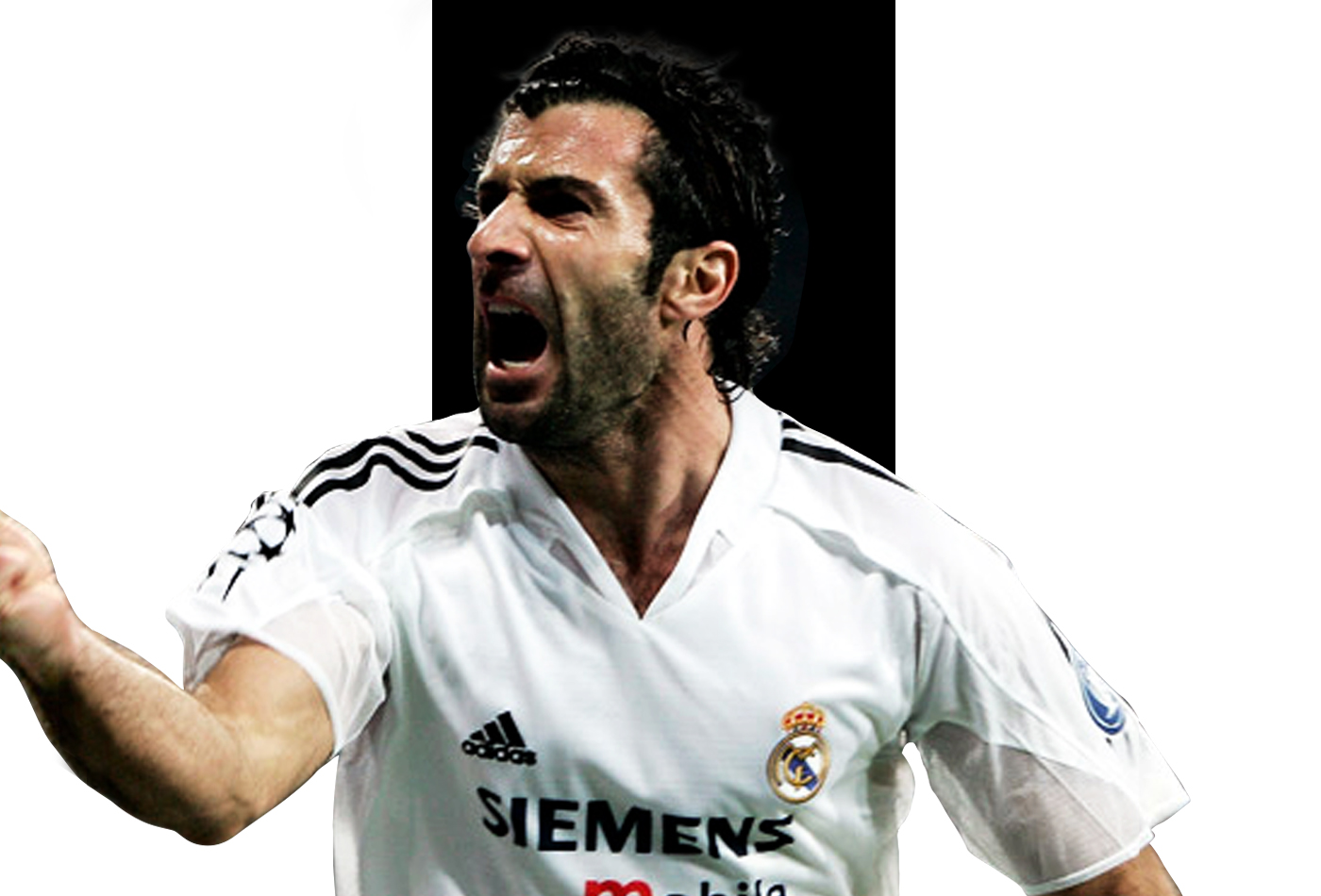Luis Figo, the last great player who traded F. C. Barcelona for Real Madrid, the man who “helped” Florentino Pérez win the elections for the presidency of the white club in 2000, the man of 10,000 million pesetas (60 million euros)…
Luis Filipe Madeira Caeiro was born and raised in Lisbon, playing football from childhood in neighbourhood teams until he signed for Sporting de Portugal at the age of 12, first playing in the youth categories until he made his debut with the first team in 1990 at the age of 17.
In 1991, Figo was crowned world champion at the U-20 World Cup held in Portugal (the second U-20 world championship that Portugal would win) as part of the so-called “Golden Generation” (along with other well-known names such as Rui Costa, João Pinto, Abel Xavier, Jorge Costa, Peixe) and coached by Carlos Queiroz, who would also be his coach at Sporting.
At the end of the 1994-1995 season there was a lot of noise around him due to the struggle that big teams had to get his services, among them Real Madrid and Barcelona (years later the same thing would happen to him, but on a bigger scale). It is said that Real Madrid did not reach the price that the Lisbon team was asking for and that is why Figo started negotiations with two Italian teams, Juventus and Parma. This fact could have had very serious consequences for his career, risking a severe sanction by UEFA for possible duplication of contract, but in the end none of this happened and F. C. Barcelona paid 230 million pesetas (about 1.5 million euros) to take the Portuguese player.
Figo, now 22 years old and one of the most promising players on the European football scene, is ending his career in Portugal (with a Taça de Portugal as his only title) to begin his career in the footballing world.
Looking back, I would catalogue Figo as one of those wingers who no longer exist today, an overflowing, over-the-top player, always ready to dribble, a partner that any forward would dream of having to supply the measured centres that he used to do.
During his time at Barcelona he quickly became a reference point for the team and an idol for a fan who had been devastated by losing one of his best players – Michael Laudrup – to play for eternal rivals Real Madrid the previous season.
In the five seasons he was in Barcelona, Figo would win 2 Leagues, 2 Cups and a Spanish Super Cup, as well as a Super Cup and a European Cup Winners’ Cup.
We arrive at the year 2000, one of the most important, if not the most important, in the career of the Portuguese player. At the end of that campaign with Barcelona (without titles), Figo participates with his team in the EURO-2000 held in Belgium and the Netherlands, putting on a great performance throughout the tournament and helping his team reach the semi-finals, where they would lose to Zinédine Zidane’s France, finally European champions, but it is at the end of the tournament when Figo’s career will take a 360-degree turn.
While the tournament was going on normally, something was happening in the capital of Spain. After having won a League, two Champions League and an Intercontinental Cup, the current president of Real Madrid, Lorenzo Sanz, calls elections for the presidency of the white club. Everyone had taken the continuity of the current president for granted, but something went wrong.
A stranger to the majority called Florentino Pérez, burst into the election campaign announcing that if he was elected president he would bring Luis Figo to play at the Santiago Bernabéu and, so sure of his word, he promised to pay the team’s season fees for a year if he did not keep his word.
Much was said at the time, and is still talked about today, about how such an agreement could happen… it was said that it was Figo’s agent, without his consent, who orchestrated everything to achieve a salary increase with a contract renewal with Barcelona, but it was never known for sure if Figo was aware of these manoeuvres by his agent with the candidate Florentino Pérez, the only thing we know for sure is that Florentino Pérez, against all predictions, won these elections and became president of Real Madrid.
A few days later, Florentino Pérez and Luis Figo saw each other in a hotel in Lisbon, where they closed the deal that would make Figo a white player by paying the cancellation clause, which amounted to 10. 000 million of the old pesetas, some 60 million euros at the exchange rate (although there are also gaps as to whether this was a cancellation clause payment or an agreed transfer, as there are sources indicating that VAT was paid and the total amount of the operation was 11,900 million pesetas).
In any case, on July 25, 2000, Figo became the most expensive signing in the history of football and was presented as a Real Madrid player in the trophy room of the Santiago Bernabéu, escorted by Florentino Pérez and Alfredo Di Stéfano holding the number 10 shirt that would accompany him during his career at the Chamartín club.
Nobody knew it yet, but the first “galactic” had landed in the white galaxy.
The news fell like a bomb in Barcelona, calling Figo a traitor and turning him from a hero into a villain overnight. A blow so hard on the club – wasting all the money received by Figo on players who wouldn’t measure up – that it would take years to recover from it.
While it is true that Figo’s first steps as a Real Madrid player were closely scrutinised by the white supporters, he soon gained their affection thanks to his great performances.
His first season at Real Madrid could not have started better, both collectively – winning the league title – and individually – winning the Golden Ball and finishing second in the FIFA World Player.
For the memory of that season there will also be “El Clásico” played at the Camp Nou. For many days the atmosphere was heating up with all sorts of messages in the press and out-of-tune statements from the blues side, even the Camp Nou speaker was interviewed in a newspaper and said he was going to stop when he named Figo so that people could whistle more.
In a climate of high tension unprecedented in the history of the “Clásicos”, Figo had to put up with record-breaking whistling sounds every time he touched the ball, and it was even agreed that he would not take the corners out to avoid getting close to the crowd, an inter-war climate that ended up infecting the whole team and ended up losing the match 2-0.
The following season, Figo is no longer the most expensive player in history as he passes the baton to his new Real Madrid teammate, Zinédine Zidane.
This is an atypical season for the Portuguese player, because he could not have regularity in his game due to a serious injury in his ankle that kept him out of the pitch for a long time, and that caused him not to be able to return to Barcelona to play the semi-final of the Champions League that faced Real Madrid against Barcelona, with victory and classification for the final that was held in Glasgow.
Figo recovers in time to play the final in Glasgow and would get, along with Zidane (scorer of the winning goal with his incredible volley, one of the best goals ever seen in a final), the desired European Cup that would adorn his great record. In addition to this, it is worth remembering that he was chosen that season as the winner of the FIFA World Player ahead of David Beckham and Raul.
The 2000-20001 season begins as well as it finished the previous one for Luis Figo obtaining a new continental title, the European Super Cup won against Feyenoord one day before the landing of a new “galactic” teammate, Ronaldo Nazario.
This season Figo would expand his record even further by winning the Intercontinental Cup and a new league championship, with the blot on his copybook of the Champions Legue semi-final elimination against Juventus with a penalty missed by him in the second match that could change the course of the game.
But that season, even with all those titles won, will always be remembered for the “Classic of the piglet”.
The previous season, due to injuries, Figo did not return to the Camp Nou, but this season he would do it again, it would be his second visit to the Condal City with the white shirt, and if in the first occasion the atmosphere was heated, this time it would be overcome by much.
The blasts and signs against the Portuguese player were the same or higher than in the last visit, only this time Figo would throw the corners and, every time this happened, the public threw everything they had at hand to the player. On televisions all over the world you could see sandwiches, glasses, a bottle of whisky and ….. a pig’s head flying!
The match had to be suspended for 15 minutes to calm down and in the end, luckily for everyone, nobody was injured and the match ended with a 0-0 draw.
His next season at Real Madrid was marked by the arrival of a new “galactic” who came to take his place on the pitch. David Beckham landed in Madrid with great scepticism and much speculation from the press as to how the arrival of the English player might affect Figo.
That season, Figo maintains his role on the team’s right wing and wins what would ultimately be his last title with Real Madrid, the Spanish Super Cup.Although it is true that the team seemed to go like a rocket in the league, being the leader of the championship and a finalist in the King’s Cup, it was in the wake of this final, lost to Real Zaragoza, that the team collapsed in the final stretch of the championship and fell dramatically in the Champions League against an inferior rival like Monaco (they would go on to be finalists in the competition) and would lose the league by dropping most of the points until the end of the season.
So, in that strange way, he ended that season for Figo in a tense atmosphere from the noble zone of the club to the players themselves.
In the 2004-2005 season Figo receives a new Golden Ball as a teammate, this time Michael Owen, but as in the end of the previous season, the atmosphere was very tense and, with coaches dancing through, Vanderley Luxemburgo arrived to give him the lace, which soon began to leave him out of the starting eleven claiming that his characteristics did not fit into his game plan… Others would see the hand of the club’s leadership in that decision in a clear “invitation” to the player to leave the club.
Said and done, the season ended without a title and although Figo still had a year left on his contract, he reached an agreement with the club to rescind his contract and obtain a letter of freedom to negotiate with any club.
The first galactic to join the club was also the first to leave it, on the way to 33 years of age, he would sign with Inter Milan.
He spent a total of four seasons at the nerazzurro club, where he won four Scudettos to put an end to his career in 2009 at the age of 37.
Few players end their professional careers in the top leagues of football without seeking one last contract in some exotic league, but Figo was not one of those cases.
The first galactic player said goodbye from the galaxy.


